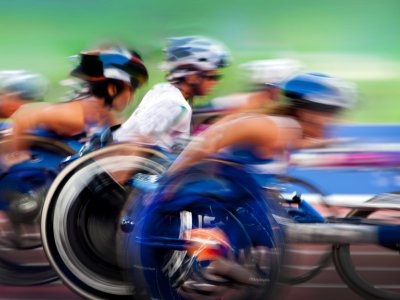
provide fairer wheelchair racing competition
With the Gold Coast to host the largest Para sport program in Commonwealth Games history, classification is integral to ensure competitions are contested on a level playing field.
An evidence-based classification system currently in development by University of Queensland researchers has the potential to provide fairer wheelchair racing competition in the future.
Dr Mark Connick from UQ’s School of Human Movement and Nutrition Sciences said increased transparency, robustness and objectivity can be achieved in Para sport classification systems if decisions are supported by a scientific basis.
“In the current system, best practice requires classifiers to use their expertise to allocate athletes to a class,” Dr Connick said.
“Current methods work well when the impairment profiles of athletes closely match a class profile.
“However, in some instances where athletes have impairments that fit multiple class profiles, classifiers have a more difficult decision to make.
“Our research aims to help classifiers in the decision-making process by developing methods that provide evidence-based, scientifically defensible classification recommendations.”
The researchers tested 32 international level, male wheelchair racers from classes T51 to T54 using six isometric strength tests that evaluated elbow extensors, shoulder flexors, trunk flexors, forearm pronators and two wheelchair performance tests.
Results from the strength tests were used to group athletes according to the similarity of the location and severity of their strength impairments.
“The current method to allocate athletes to a class is best practice, so we are excited about the potential to further improve classification by developing a method that will help classifiers make more defensible decisions,” Dr Connick said.
“It will increase the transparency and objectivity of decision-making and reduce the dependence on clinical judgment.
“Further research is needed before the system can be implemented.
“The next step is to replicate the findings in a larger, representative sample in male and female athletes.”
This project was carried out with the support of the International Paralympic Committee (IPC) to develop evidence-based classification systems in Paralympic athletics.
Dr Mark Connick and his colleagues, Associate Professor Sean Tweedy and Dr Emma Beckman, are members of the IPC Classification Research and Development Centre for Physical Impairments, which is supported by the International Paralympic Committee.
The study was published in the British Journal of Sports Medicine.
Media: Dr Mark Connick, m.connick@uq.edu.au, +61 7 336 56117; Kirsten O’Leary, UQ Communications, k.oleary@uq.edu.au, +61 7 3365 7436.



